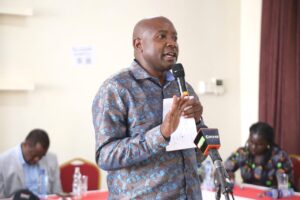
| Mwau Dorothy |
The Azimio la Umoja coalition is grappling with significant internal divisions over the recent
appointment of its members to government positions.

The dispute has raised serious questions
about the unity and cohesion within the coalition, with some members expressing dissatisfaction
with the selection process.
Several coalition members have voiced concerns that the appointment process was neither fair
nor transparent. They allege that the selections were made without adequate consultation and that
certain individuals were favored over others, leading to widespread discontent.
“Some of these appointments were done without the involvement of all members. We feel that
there are those who were given preferential treatment,” said one Azimio member who preferred
to remain anonymous. The member emphasized the need for transparency and fairness to avoid
divisions within the party.
In response to the allegations, senior leaders within Azimio have sought to quell the unrest by
affirming that the appointments followed all necessary procedures. They argued that the
complaints are personal grievances rather than systemic issues.
The chairman of the Azimio coalition stated, “We believe these appointments were fair and made
in the best interests of the party and the general public. We urge our members to work together
and avoid unnecessary conflicts.”
Despite these assurances, the internal discord appears to persist. Some members have threatened
to take disciplinary action against the leaders involved in the appointment process, exacerbating
the tension within the coalition.

The controversy has highlighted deeper issues within Azimio, including questions about
leadership and the distribution of power. Members are calling for more inclusive decision-
making processes to ensure that all voices are heard and respected.
Political analysts suggest that the ongoing dispute could weaken Azimio’s position as a unified
political force. If the rift is not addressed, it could impact the coalition’s effectiveness in both
governance and upcoming electoral contests.
The leadership of Azimio has committed to holding a series of meetings aimed at resolving the
disagreements and restoring harmony within the coalition. These meetings will involve key
stakeholders and are expected to address the root causes of the discontent.
There are calls from within the party for a review of the appointment process to enhance
transparency and ensure that future selections are more inclusive. This could involve setting up a
special committee to oversee appointments and ensure that all members have a say.
Amidst the internal strife, some members remain hopeful that the coalition can overcome the
current challenges and emerge stronger. They believe that addressing the concerns openly and
constructively is key to maintaining the unity of Azimio.
As Azimio la Umoja navigates this period of internal conflict, the coming weeks will be critical
in determining the coalition’s future direction. The ability to manage these disputes and foster a
collaborative spirit among its members will be essential for its long-term success.





